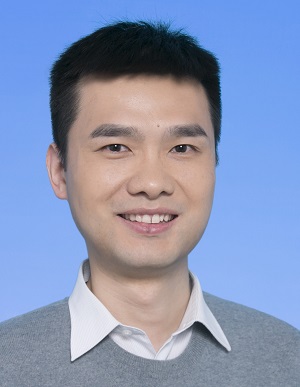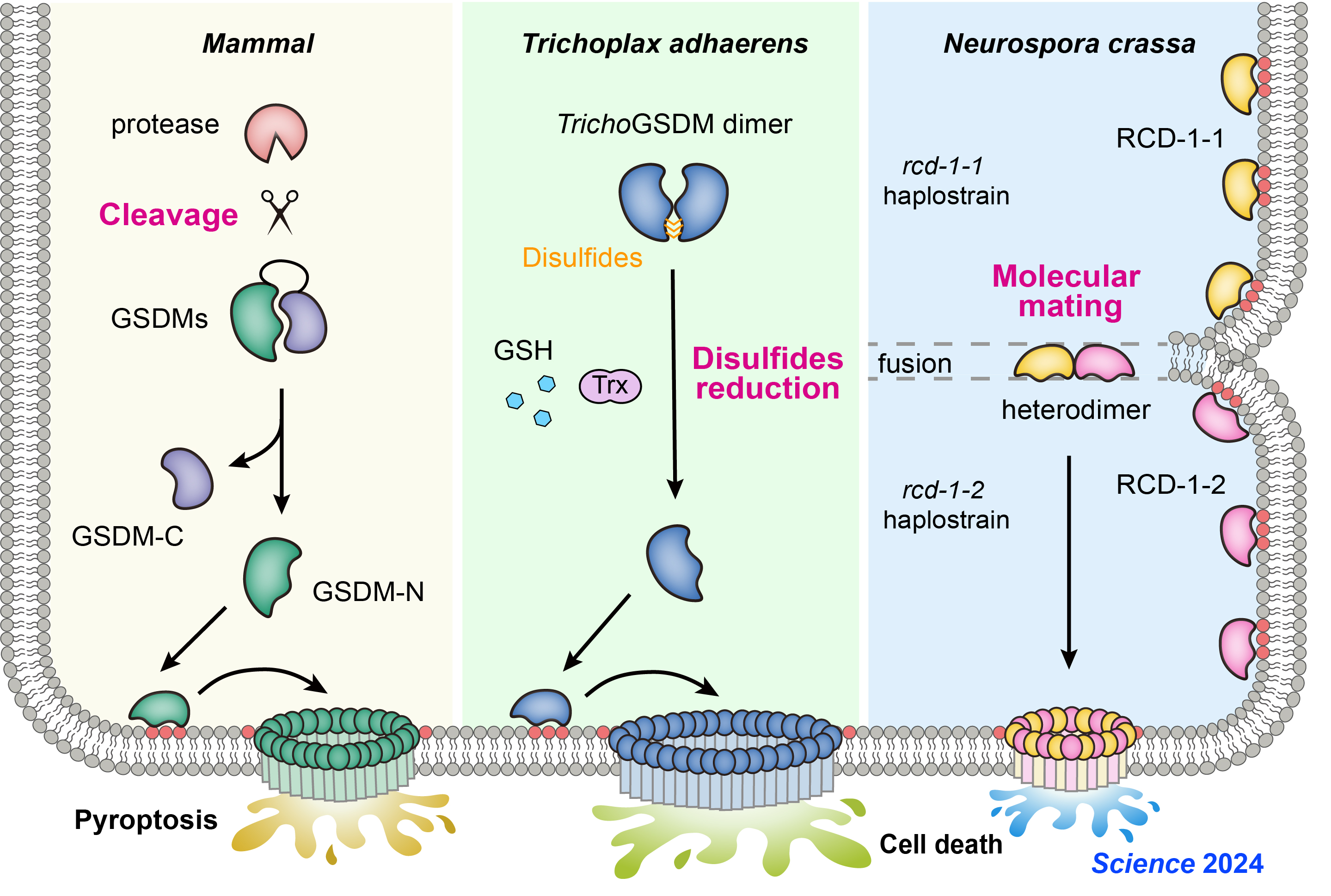
Jingjin Ding, Ph.D, Prof.
-
Principal Investigator
State Key Laboratory of Biomacromolecules, IBP
Research Interests: Molecular mechanisms of pyroptosis and innate immunity
Email: jding@ibp.ac.cn
Tel: 010-64888548
Address: 15 Datun Road, Chaoyang District, Beijing, 100101, China
Chinese personal homepage
- Biography
1999 - 2003 B.Sc., College of Life Sciences, Wuhan University
2003 - 2008 Ph.D., Institute of Biophysics, Chinese Academy of Sciences
2008 - 2010 Postdoc, Institute of Biophysics, Chinese Academy of Sciences
2010 - 2011 Research assistant, Institute of Biophysics, Chinese Academy of Sciences
2012 - 2017 Associate Professor, Institute of Biophysics, Chinese Academy of Sciences
2013 - 2017 Visiting Scientist, National Institute of Biological Sciences, Beijing
2018 - Professor, Institute of Biophysics, Chinese Academy of Sciences
- Awards
2024 Youth Beijing Scholar
2024 Chinese Academy of Medical Sciences “China's Major Medical Achievements of the 21st Century”
2022 Excellent Member of the Youth Innovation Promotion Association, CAS
2020 Standing committee member of the Subsidiary Society for Cell Death Research, Chinese Society for Cell Biology
2019 National Outstanding Youth Science Fund
2018 Chen-Lu Tsou Excellent Research Paper Award in 2016, Chinese Society of Biochemistry and Molecular Biology
2017 Member of the Youth Innovation Promotion Association, CAS
- Membership in Academies & Societies
- Research Interests
Innate immune system is the first line for host defense against pathogen infection. Subverting host immune defense by bacterial effector proteins is emerging as a key virulence mechanism for the pathogenesis of bacterial pathogens. We systematically investigate the molecular mechanisms underlying host antibacterial innate immunity and bacterial virulence by using multi-disciplinary approaches including biochemistry, structural biology, and cell biology. Our recent research focus on the topic about pyroptosis, inflammation, and bacterial antagonism.

Figure 1. Molecular mechanisms for pyroptosis activation, pro-inflammation, regulation, and intervention

Figure 2. Evolutionary conservation and mechanistic diversity of pyroptosis pathways
- Grants
- Selected Publications
1. Li, Y.#, Hou, Y.#, Sun, Q.#, Zeng, H., Meng, F., Tian, X., He, Q., Shao, F.* & Ding, J*. (2024) Cleavage-independent activation of ancient eukaryotic gasdermins and structural mechanisms. Science. 384(6697): adm9190.
2. Shi, X.#, Sun, Q.#, Hou, Y., Zeng, H., Cao, Y., Dong, M., Ding, J.* & Shao, F*. (2023) Recognition and maturation of IL-18 by caspase-4 noncanonical inflammasome. Nature. 624(7991), 442-450.
3. Zhong, X.#, Zeng, H.#, Zhou, Z.#, Su, Y., Cheng, H., Hou, Y., She, Y., Feng, N., Wang, J., Shao, F.* & Ding, J.* (2023) Structural mechanisms for regulation of GSDMB pore-forming activity. Nature. 616, 598-605.
4. Hou, Y.#, Zeng, H.#, Li, Z., Feng, N., Meng, F., Xu, Y., Li, L., Shao, F.* & Ding, J.* (2023) Structural mechanisms of calmodulin activation of Shigella effector OspC3 to ADP-riboxanate caspase-4/11 and block pyroptosis. Nat Struct Mol Biol. 30, 261-272.
5. Xu, Y., Cheng, S., Zeng, H., Zhou, P., Ma, Y., Li, L., Liu, X., Shao, F.* & Ding, J.* (2022) ARF GTPases activate Salmonella effector SopF to ADP-ribosylate host V-ATPase and inhibit endomembrane damage-induced autophagy. Nat Struct Mol Biol. 29, 67-77.
6. Xu, Y. & Ding, J.* (2022) Endomembrane damage sensing by V-ATPase recruits ATG16L1 for LC3 lipidation in situ. Autophagy. 18, 2751-2753.
7. Feng, N.#, Feng, H.#, Wang, S., Punekar, A.S., Ladenstein, R., Wang, D.C., Zhang, Q.*, Ding, J.* & Liu, W.* (2021). Structures of heat shock factor trimers bound to DNA. iScience. 24, 102951.
8. Wang, K.#, Sun, Q.#, Zhong, X., Zeng, M., Zeng, H., Shi, X., Li, Z., Wang, Y., Zhao, Q., Shao, F.* & Ding, J.* (2020). Structural mechanism for GSDMD targeting by autoprocessed caspases in pyroptosis. Cell. 180, 941-55.
9. Ding, J.*, Pan, X., Du, L., Yao, Q., Xue, J., Yao, H., Wang, D. C., Li, S.* & Shao, F.* (2019). Structural and functional insights into host death domains Inactivation by the Bacterial Arginine GlcNAcyltransferase Effector. Mol Cell. 74, 922-35.
10. Ding, J.* & Shao, F.* (2018). Growing a gasdermin pore in membranes of pyroptotic cells. EMBO J. 37, e100067.
11. Ding, J. & Shao, F. (2017). SnapShot: The Noncanonical Inflammasome. Cell. 168, 544-4.
12. Ding, J., Wang, K., Liu, W., She, Y., Sun, Q., Shi, J., Sun, H., Wang, D. C.*& Shao, F.* (2016). Pore-forming activity and structural autoinhibition of the gasdermin family. Nature. 535, 111-6.
13. Wang, X., Hou, Y., Deng, K., Zhang, Y., Wang, D. C.* & Ding, J.* (2015). Structural Insights into the Molecular Recognition between Cerebral Cavernous Malformation 2 and Mitogen-Activated Protein Kinase Kinase Kinase 3. Structure. 23, 1087-96.
14. Feng, H.#, Ding, J.#, Zhu, D.#, Liu, X., Xu, X., Zhang, Y., Zang, S., Wang, D. C.*& Liu, W.* (2014). Structural and mechanistic insights into NDM-1 catalyzed hydrolysis of cephalosporins. J Am Chem Soc. 136, 14694-7.
15. Wang, W.#, Ding, J.#, Zhang, Y., Hu, Y.*& Wang, D. C.* (2014). Structural insights into the unique single-stranded DNA-binding mode of Helicobacter pylori DprA. Nucleic Acids Res. 42, 3478-91.
16. Guo, L.#, Ding, J.#, Guo, R., Hou, Y., Wang, D. C.*& Huang, L.* (2014). Biochemical and structural insights into RNA binding by Ssh10b, a member of the highly conserved Sac10b protein family in Archaea. J Biol Chem. 289, 1478-90.
17. Xu, X., Wang, X., Zhang, Y., Wang, D. C.* & Ding, J.* (2013). Structural basis for the unique heterodimeric assembly between cerebral cavernous malformation 3 and germinal center kinase III. Structure. 21, 1059-66.
18. Wang, T.#, Ding, J.#, Zhang, Y., Wang, D. C.* & Liu, W.* (2013). Complex structure of type VI peptidoglycan muramidase effector and a cognate immunity protein. Acta Crystallogr D Biol Crystallogr. 69, 1889-900.
19. Ding, J.#, Wang, W.#, Feng, H., Zhang, Y. & Wang, D. C. (2012). Structural insights into the Pseudomonas aeruginosa type VI virulence effector Tse1 bacteriolysis and self-protection mechanisms. J Biol Chem. 287, 26911-20.
20. Gong, Y.#, Zhu, D.#, Ding, J.#, Dou, C. N., Ren, X., Gu, L., Jiang, T. * & Wang, D. C.*(2011). Crystal structures of aprataxin ortholog Hnt3 reveal the mechanism for reversal of 5'-adenylated DNA. Nat Struct Mol Biol. 18, 1297-9.
21. Ding, J., Wang, X., Li, D. F., Hu, Y., Zhang, Y. & Wang, D. C. (2010). Crystal structure of human programmed cell death 10 complexed with inositol-(1,3,4,5)-tetrakisphosphate: a novel adaptor protein involved in human cerebral cavernous malformation. Biochem Biophys Res Commun. 399, 587-92.
22. Ding, J., Bao, J., Zhu, D., Zhang, Y. & Wang, D. C. (2010). Crystal structures of a novel anti-HIV mannose-binding lectin from Polygonatum cyrtonema Hua with unique ligand-binding property and super-structure. J Struct Biol. 171, 309-17.
(From Jingjin Ding, December 18, 2024)

